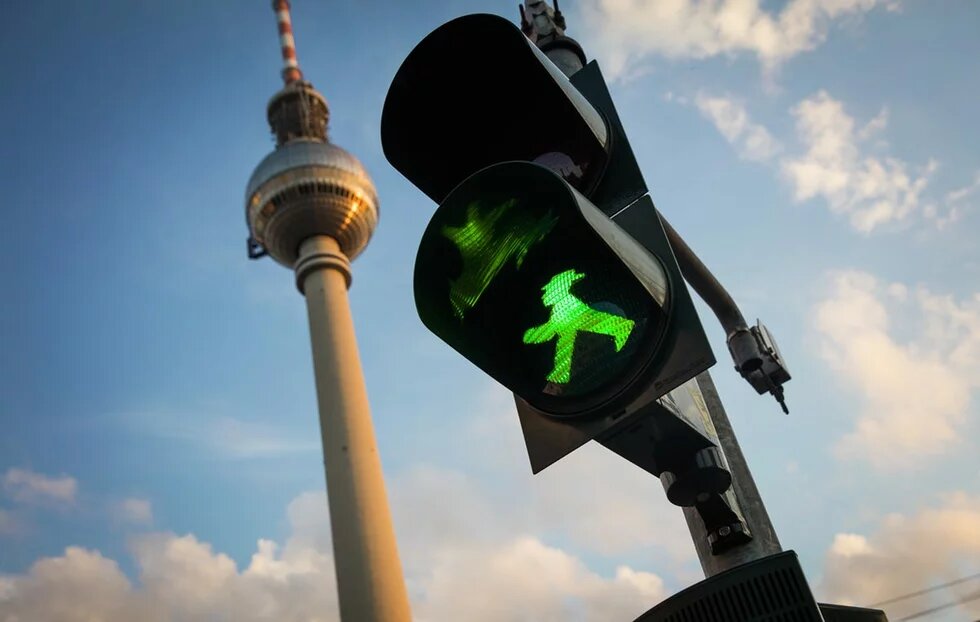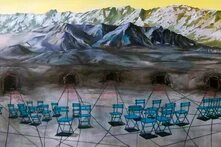A new wave of Azerbaijani migration is taking shape in Berlin - politically engaged, largely left-leaning, and critical of both the regime and the opposition back home. Unlike earlier migrants, they do not identify with traditional diaspora structures nor fully align with existing dissident circles. Their community remains fragile, shaped by legal precarity and the psychological toll of exile. Yet there are signs that an 'alternative Azerbaijani diaspora' - one defined more by shared values than by nationality - is emerging.

*Most of the names in this article have been changed for safety reasons.
The New Tbilisi
“Berlin is becoming the new Tbilisi,” Aysel says.
We are standing on the Eberswalder Straße, waiting for the light to turn green.
The first day of the forum left behind – a gathering of South Caucasus activists, independent researchers, and journalists with shared ideas: leftism, feminism, and anti-militarism. And, for some, a shared migrant fate.
Once before, they would have met like this in Tbilisi – spending the day planning how to change the world, and the evening drinking beer, and laughing bitterly and carelessly at the utopia of these plans.
Now, those meetings are slowly moving to Berlin. That is what Aysel meant.
She is part of what might be called an “alternative diaspora” of Azerbaijanis – a new community of dissidents that is subtly forming in the German capital. And this process deserves to be captured.
Since the collapse of the Soviet Union, Germany has been one of the main destinations for Azerbaijani emigrants of all kinds. But over the past few years, this phenomenon has grown in scale and shifted in character. The Azerbaijani crowd in Berlin – a mix of economic migrants, career professionals, and opposition figures fleeing persecution – has been joined by a different group: political and ideological exiles who were marginals even for the above-listed categories back home.
The dark years for Azerbaijani civil society began around 2013-2014. New laws tightened control over NGOs and the independent media, cutting off their only source of funding – foreign grants.
Then, in 2020, during the Second Karabakh War, things got worse. Anti-militarists became targets – not only of the authorities but also of public anger.
By 2023-2024, the crackdown reached its peak. Within a single year, at least two dozen activists, journalists, and civil society figures were arrested on criminal charges. According to international human rights organizations, their only “crime” was to think differently, to investigate corruption, and to criticize those in power.
That was the moment when even the most fearless ones finally "raised their sails" - fled in every direction.
In previous years, many Azerbaijani dissidents who wanted/had to emigrate would choose neighboring Georgia, a visa-free country considered a stronghold of democracy in the South Caucasus. A pretty large group of Azerbaijanis has already gathered here, but from 2023, the situation in Georgia began to deteriorate, too. The ruling Georgian Dream party introduced laws restricting NGOs and the media, similar to those adopted in Azerbaijan a decade earlier. Mass protests flooded the streets of Tbilisi.
Even some Georgians – members of an unbreakable, fearless civil society – started to leave. And watching this, Azerbaijani migrants in Georgia realized the thing: if even local residents were no longer safe, then foreigners with a fragile legal status had even more reason to seek refuge elsewhere — before "the hangover of someone else’s party" hit them.
A Collective Portrait
Now, many of these fugitives have settled here, in Berlin.
Their wave of migration coincided with the much larger exoduses from Russia and Belarus – and so it passed almost unnoticed. Azerbaijani political exiles are fewer and less organized than their “comrades in misfortune” from the neighboring countries.
And yet, there is reason to believe that, once they recover from the initial shock, they might begin to build a strong community.
Or not?..
As mentioned earlier, this new "generation" of Azerbaijani migrants in Berlin stands apart from their compatriots through a particular mix of political and social attitudes.
If we try to sketch a collective portrait, it might look like this:
- They are relatively young, yet already mature – somewhere between 30 and 45.
- They lean mostly to the left, although the "shades of red" vary.
- They stand for gender equality, even if they are not all activists.
- They are firm anti-militarists and anti-nationalists – especially when it comes to the Karabakh conflict.
- They distrust both the Azerbaijani government and the traditional opposition.
Actually, not all of them came during the latest and most powerful wave.
Some moved earlier – when the first dark clouds began to gather over Azerbaijan.
But back then, they were too few to form any kind of circle, and the situation was not yet sharp enough to pull them out of their private routines and push toward collective action.
If once they complained of loneliness, of being cut off from their own milieu, now that milieu has followed them here.
The same people who, ten years ago, met in cafés in Baku now meet–thinned in number but not in spirit–in Berlin bars.
They got older, they got more experienced. The youthful idealism has faded, replaced by a different kind of romance – a need to shrouded their precarious exile life in an aura of fight and resistance, at least to make it more livable.
Save and Protect
- Can you talk about your activities?
- No, sorry... It’s not safe. And honestly – it’s just too stressful. I don’t have the moral strength to talk about it right now.
Hearing Murad, a human rights defender, say he has no moral strength left sounds almost like an oxymoron.
Among his comrades, he is known as the tireless one. The liveliest one. The one who can always find a way.
But even he is worn down by a year of fighting German bureaucracy, helping others to get legal status while barely managing to keep his own. It comes from a quiet realization: he might never again have a place he could call his country. And, perhaps, the rest of his life will not be about changing the world in general, but simply about saving the small, fragile parts that remain of his own world.
For Azerbaijan’s ideological migrants in Germany, their current goals are modest, but real:
- Legal and practical support for fellow Azerbaijanis – especially those who fled in a hurry, without a plan and money;
- Public advocacy – efforts to inform European and international institutions, as well as the wider public, about what is happening in Azerbaijan.
This second mission also concerns the Azerbaijani media in exile.
Some outlets have continued their work from abroad, rebuilding teams after their colleagues back home were arrested under the charge of “currency smuggling” – a legal euphemism for receiving “illegal” foreign grants to support “subversive” activities.
And one new media project, Qazeteçi (The Journalist) “was born” right here in Berlin. It was launched in September 2025 by investigative reporter Leyla Mustafayeva.
For years, Leyla was known mainly as the wife of journalist and former political prisoner Afgan Mukhtarli – for whose release she conducted a tireless campaign in 2017-2020.
Now, Leyla – still often called “Afgan’s ex-wife” – is doing for others what she once did for him.
“All we can do for our friends who are unjustly imprisoned,” she says, “is to keep writing about them. To tell their stories. To make sure people keep paying attention. That will be one of our main missions.”
According to her, Qazeteçi will also cover current events in Azerbaijan and continue anti-corruption investigations.
But since they can no longer work inside the country, they will rely on open sources and on their readers themselves.
“Our work,” Leyla says, “will be based on crowdsourcing news gathering—collecting information directly from people, about the problems they face.”
Migrant Friendship and Migrant Love
In the summer and fall of 2025, a few events took place in Berlin, organized by South Caucasian peace activists, human rights defenders, and LGBTQ+ advocates.
Those were small, cautious steps into a new field of activity; they hoped to run in exile.
Most of these people had done similar things together before, back in Tbilisi. But here, everything had to be relearned.
They had to face new kinds of challenges — from the banal, like arranging a projector delivery without knowing the language or the rules, to the deeply personal, such as resolving internal tensions and disagreements over what their shared mission should look like in this new landscape.
It turned out that none of them had been really prepared for the role of activists in exile.
And unlike, for example, the Russians, they do not have an existing system built by previous generations of migrants.
Actually, for Azerbaijanis and other South Caucasian ideological migrants, if they choose not to blend into their "traditional" national diasporas, there is almost no institutional support at all.
“In Berlin, you realize what a real bubble it is,” says Arzu, an artist. “There are so many migrant communities here – each with its own life, its own agenda, its own way of making itself visible. And most of them have far more resources than we do. Let’s be honest – Russians, Arabs, Mexicans... at least they don’t have to start by explaining who they even are.”
She is joking that she has lost count of how many times she has had to give new acquaintances a crash course in South Caucasus geography and history.
One of the psychological traps of exile, Arzu adds, is forgetting who you are beyond the politics.
“Even in casual conversation with foreigners, I find it hard to talk about myself simply as a person but not as an Azerbaijani, a dissident, an exile. After leaving Azerbaijan, I became more aware of my Azerbaijani-ness.”
She pauses, smiling softly.
“My boyfriend is also from a troubled region. When we are together, we spend a third of our time complaining about our countries and comparing which one is worse. That’s what political-emigrant love looks like.”
Letters From a New Life
Many of them dream of turning the page, starting anew, but that is hardly possible. Every chat, every gathering, inevitably circles back to politics, to loss, to what went wrong back home. Some of them joke about it, others have simply accepted it as the tax they pay for freedom.
Berlin gives them space, but not always peace.
...When they gather, they are moaning about the weather, the bureaucracy, the endless paper envelopes in the mailbox.
For people from a warm southern country, +17 °C in August feels absurd.
For people from a place where state institutions function poorly but quite simply, German bureaucracy feels like a form of mockery.
“Paper letters used to seem romantic to me,” sighs Ayhan. “Now I associate them only with some demand from yet another office.”
A few years ago, Ayhan, a former member of a leftist movement, used to complain about being lonely in Berlin, missing his old comrades. Now many of them are here, too — and that, he says, is the only "bonus" of the situation.
“The main thing is not to get letters in yellow envelopes. Those are the worst ones,” says Murad, the most legally savvy among them. “Yellow means the court, the prosecutor’s office, or the migration service.”
“Maybe we should start writing each other paper letters,” Farida suggests. “Just to enjoy checking the mailbox again.”
She followed her husband to Berlin five years ago, and even now – with German citizenship in hand – she sometimes catches herself wondering: What am I doing here?
...When they gather, they talk about the news from Azerbaijan — and about whether German politics is really sliding to the right.
“If the AfD wins a majority next time, they’ll kick us all out… Where do we go then? Argentina?”
“They won’t win. Germany won’t repeat its mistakes.”
“Still, when I think that 20% supports them… It’s terrifying. I look around on the U-Bahn and think: one in five here might be far-right and anti-immigrant.”
“You’re being paranoid. Besides, most of the people on the U-Bahn are migrants themselves.”
...When they gather, they make sure no one “unreliable” slips into the circle. “They say he/she is connected to the Azerbaijani authorities,” – such a rumor is impossible to check, yet enough to start avoiding this person.
Even far from Azerbaijan, they can never fully relax. Some want to keep the option of visiting their families back home; others just fear their relatives could get into trouble because of them.
“That’s why most of us avoid any public activity,” says one of them. “We prefer to keep a low profile. Safety comes first. Especially since almost none of us – except those who came early, six or seven years ago – even have normal residence permits yet. Just temporary visas.”
Legal status is the first of the problems for Azerbaijani exiles in Germany. There are no humanitarian visas for them. Applying for political asylum means burning all bridges and committing to long months of waiting in refugee camps. A work visa requires a proper job, but for journalists and activists, that door is rarely open.
For some, education becomes the loophole – enrolling in a master’s or doctoral program grants a few years of legal stay, a kind of breathing space.
“I once heard that European academia is full of people from countries with wars, dictatorships, all that,” says Said, a sociologist. “I don’t know if it’s true, but it sounds like it is. Our government, in a way, motivates us to build an academic career. If I hadn’t wanted to leave Azerbaijan, I would’ve never sat down with textbooks again at 35.”
His dissertation focuses on Azerbaijan, but he still doesn’t know if he’ll ever be able to go there to conduct fieldwork.
(Not so) Small Achievement
“Do you think,” I ask, “that now, even though there are fewer of you - but still enough of you, together, mobilized, and perhaps even somewhat inspired, even if that inspiration comes from despair - you might finally manage to form a real alternative diaspora?”
Murad shrugs skeptically.
“Sometimes, I think we can… Sometimes I believe we have important activities ahead, meaningful work that might at least make us feel accomplished. But I mostly feel that way among close friends, after a couple of pints of lager…”
He laughs, raising his glass of lager in a quiet toast.
“By the way, this is a leftist place. The owners are Turkish. I’ve already made friends. Being in a foreign land, it’s important to feel part of something. It matters when you walk into a bar and the bartender nods at you and asks, ‘The usual?’”
He pauses, taking a sip.
“So... Sometimes it feels like big things lie ahead for us. But first, we need to recover. We’ve been really exhausted these past few years… We have to manage not falling out with each other, that is just as likely as uniting in times like this... We have to resist the temptation to say ‘to hell with it’ and build a new life – a simple, quiet life. Most of us are at that age when stability matters.”
He smiles faintly.
“Time will tell. For now, every small achievement – resolving some bank issues – encourages us, gives us hope. Although, come to think of it... resolving issues with a German bank is not a small achievement…”
The Content of the article is the sole responsibility of the author and can in no way be taken to reflect the views of the Heinrich Boell Foundation Tbilisi Office - South Caucasus Region

